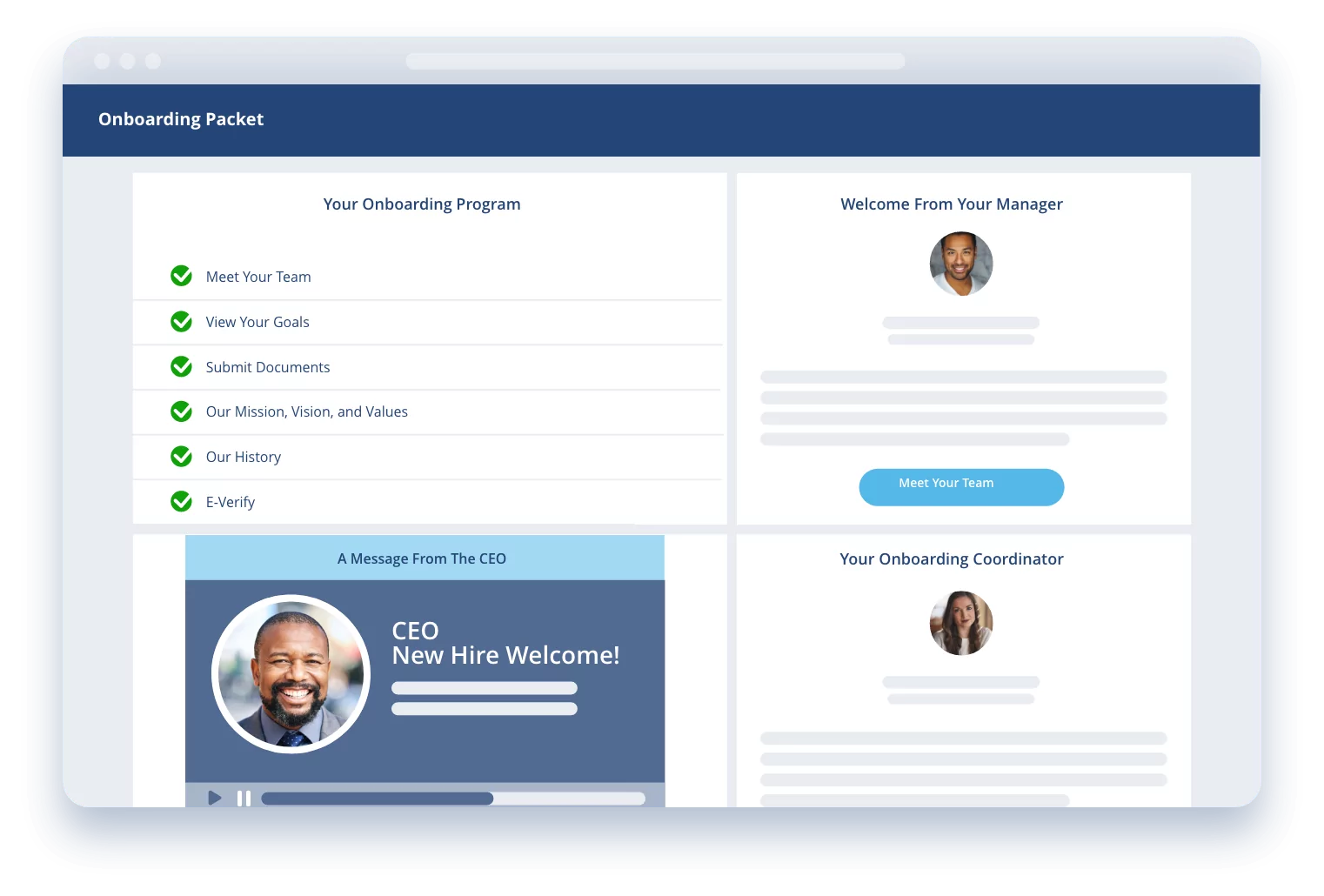The fact that diversity, equity, inclusion, and belonging (DEIB) are integral to the success of leading companies is a foregone conclusion. 93% of organizations agree that belonging contributes to business performance. Evidence shows that DEIB leads to higher revenue, greater agility and creativity, and increased employee retention. Employee performance increases by 56% when they feel a sense of belonging.
🗝️ Unlock the power of inclusive onboarding! Find out how to make new hires feel valued, foster inclusivity, and create a culture where everyone feels they belong:But creating a truly diverse and inclusive workplace is about more than just meeting hiring quotas or headcount goals. True DEIB is woven into company culture; a lived value that impacts every process and procedure, especially those used by human resources teams. Your HR team can start from the beginning with an inclusive onboarding process that integrates new hires into the organization while celebrating and leveraging their unique backgrounds and perspectives.
A great onboarding process has the power to instill a sense of belonging in your new hires and foster an inclusive workplace. Onboarding doesn’t just make them feel welcome — it builds relationships, encourages learning, makes people more productive, and increases retention rates. But, it can be challenging to navigate cross-cultural communication and deeper social issues to ensure inclusivity.
That's why we’re sharing actionable strategies you can use to create an inclusive onboarding experience. In this article, we'll explore a few best practices for diversity and inclusion in onboarding and how this approach impacts team dynamics long-term and contributes to a work culture where people feel they belong.
1. Representation Matters: Making Onboarding Materials Diverse
Onboarding materials usually include a company handbook, welcome videos, employee success stories, etc. — all materials that feature your current employees. If every person represented looks the same and has a similar story, e.g. everyone is white and able-bodied with a college education, you risk alienating new hires who don’t fit that description. That’s especially true if your hiring process is diverse — you don’t want that representation to end on their start date.
Ensure that your new hires hear stories from employees from a variety of backgrounds and your imagery represents people of different races, ages, genders, and abilities. Doing so ensures everyone is on the same page when it comes to respecting and valuing differences and sends a clear message to your new hires: "You belong here."
2. Education Empowers: Providing Cultural Competency Training
More and more companies are hiring remote workers globally, and that means there are often cultural differences among workers that can lead to misunderstandings. You can avoid these incidents and lay the foundation for inclusivity with cultural competency training. Cultural competency training helps all employees, especially managers, navigate the complexities of cross-cultural communication.
The goal of this training is to help managers, current employees, and new hires understand different cultures, reduce miscommunication, and promote a more inclusive work environment. Cultural competency training isn’t just about gaining knowledge — it’s about fostering empathy, respect, and appreciation of different cultural perspectives. This shared understanding helps new hires and existing employees build connections based on a shared commitment to inclusivity.
Learn how representation, mentorship, and open communication are part of an inclusive onboarding strategy. 🌍🤗 #DiversityMatters #InclusiveWorkplace3. Onboarding Allies: Mentors Make a Difference
If you implement just one tip from this list, starting a mentorship program is likely to have the biggest impact. 91% of employees with a mentor say they’re satisfied with their job. Pairing new employees with experienced mentors gives them a reliable source of guidance, a sounding board for questions, and an immediate sense of belonging. Mentors can help new hires navigate the organization's culture, understand expectations, and provide emotional support during the transition.
Mentorship benefits everyone involved — mentor, mentee, and your business as the sponsor. Mentor relationships can be particularly significant for employees from underrepresented groups because they have a trusted ally from the start. Mentorship also enables knowledge sharing, ensuring that the rich tapestry of experiences within the organization benefits every employee. This makes for a faster onboarding process and helps build trust and connections among employees from diverse backgrounds.
Is Onboarding Inclusive?
Ask New Hires
Wondering if your new employees’ onboarding experience is as inclusive as you think? Ask for feedback —send out a New Hire Survey when onboarding is complete and include a question about inclusivity.
Learn more about how you can evaluate the effectiveness of your onboarding.
4. Discuss Diversity: Communication Builds Inclusivity
If you’re not talking about your company’s DEIB initiatives often and openly, there’s a good chance they’re not being prioritized — or they’re nonexistent. At least, that’s the message you’re sending new hires.
Open communication when onboarding diverse teams is key to building an inclusive workplace. Creating spaces where employees can express their thoughts, ask questions, and discuss DEIB openly is crucial for fostering a culture of respect and understanding. It ensures that new hires feel their unique backgrounds and perspectives are acknowledged, respected, and valued.
You can foster conversations about DEIB during onboarding through facilitated discussions or workshops or by inviting new hires to participate in employee resource groups (ERG) that are specific to their identities. Invite new hires to share their experiences and perspectives and ask about your company’s DEIB progress. This helps educate everyone about the importance of DEIB and reinforces the message that all voices are valued in your organization.
It’s also essential that communication is effective and accessible in order to contribute to an inclusive onboarding process. That means providing information in multiple formats to accommodate your employees’ different learning styles and accessibility needs. It also means asking for and actively listening to new hires' feedback and concerns.
5. Break the Ice: Activities to Strengthen Bonds and Engage Employees
Strengthening bonds among your employees is another way to cultivate inclusivity. Team-building activities, ice-breakers, and social events can help new hires get to know their colleagues on a more personal level and help form those essential bonds. These activities should be designed with DEIB in mind, meaning they’re accessible and enjoyable for everyone.
These activities can range from team-building exercises that celebrate diversity to interactive sessions that encourage employees to share and learn from one another. These activities make onboarding more engaging while fostering a sense of belonging and a supportive, cohesive team from the outset.
When your employees feel like they belong, their voices are respected, and their opinions matter from day one, it only makes sense that they want to stick around as long as possible. Give them a reason to — sustain an inclusive workplace throughout the entire employee lifecycle with the help of onboarding software:
- Publish inclusive job descriptions on a variety of job boards and allow job seekers to complete applications in their language of choice.
- Create standardized Interview Guides and Scorecards to reduce interview and hiring bias.
- Design inclusive Onboarding programs that recognize and celebrate diversity while building connections and camaraderie.
- Evaluate performance fairly and on a regular basis in tandem with regular check-ins and conversations.
- Offer internal mobility and professional development opportunities via mentorship or coaching, continuing education, and more.
Keep reading to learn more about how DEIB impacts the employee experience and your business and how software can help you create and maintain an inclusive workplace. Together, we can make a difference in fostering workplaces where everyone feels they belong.




